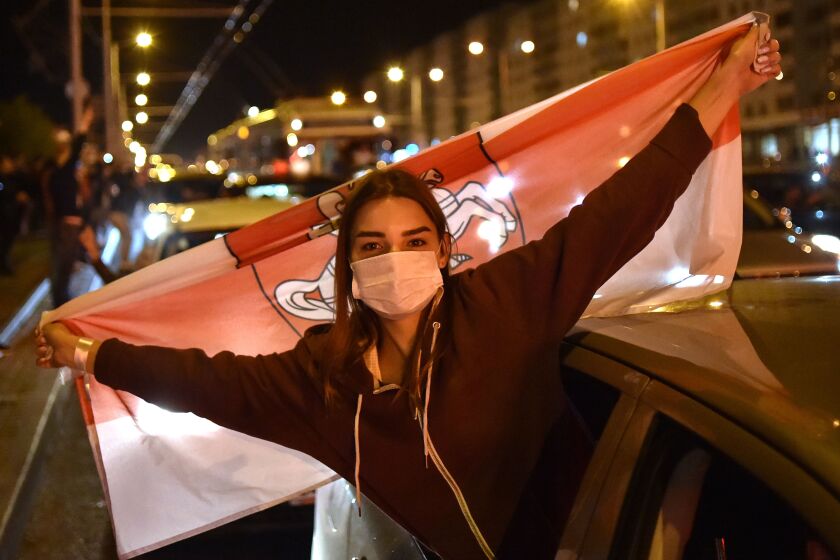Belarus opposition leader urges EU to support her ‘awakening’ country
AND THEY DO AFP VIDEO REPORT ADDED AT THE END

Protesters against Belarusian President Alexander Lukashenko stand in front of the Minsk Tractor Factory holding posters supporting workers.
(Dmitri Lovetsky / Associated Press)
By ASSOCIATED PRESS
AUG. 19, 2020
MINSK, Belarus —
The Belarusian opposition leader has called on European leaders not to recognize “fraudulent elections” that extended the rule of authoritarian President Alexander Lukashenko and sparked unprecedented mass protests in the country.
In a video statement released ahead of EU leaders’ emergency summit on the situation Wednesday, Sviatlana Tsikhanouskaya urged them to support “the awakening of Belarus.”
“I call on you not to recognize these fraudulent elections. Mr. Lukashenko has lost all the legitimacy in the eyes of our nation and the world,” Tsikhanouskaya said.
Lukashenko, who has been dubbed “Europe’s last dictator,” has run the ex-Soviet nation of 9.5 million with an iron fist since 1994, and won a sixth term with 80% of votes in an Aug. 9 election widely seen as rigged. Tsikhanouskaya, a 37-year-old former English teacher and political novice who united fractured opposition groups and drew tens of thousands to rally in her support, got only 10%.
She dismissed the results as falsified and demanded a recount, but then suddenly left the country for Lithuania in a move her campaign said was made under duress. Thousands of protesters have been arrested by authorities and have alleged beatings and other abuse.
On Wednesday morning, rallies resumed in Minsk, and police once again started detaining protesters. Nearly 50 people were detained in front of the Minsk Tractor Factory, where workers have been on strike since Monday, according to Sergei Dylevsky, leader of the factory’s strike committee.

‘Go away!’ Workers heckle Belarus leader as support collapses around him
Aug. 17, 2020
“People are on strike demanding Lukashenko’s resignation, and authorities respond with batons and riot police,” Dylevsky said. “Lukashenko is not changing.”
Police also blocked all entrances to the Janka Kupala National Theater in Minsk, where the troupe on Tuesday gave notice en masse after its director, Pavel Latushko, was fired for siding with protesters. Actors who arrived at the theater Wednesday morning were not allowed in.
“It’s unprecedented that, in the 21st century, law enforcement is deployed to a cultural institution. The situation speaks for itself,” Latushko said.
It’s not entirely clear what the European Union can do right now, but its leaders appear determined to help maintain the momentum for change in Minsk with a show of political support and to revive a sanctions program on Belarus that was eased four years ago as relations with Lukashenko improved.

Women move to forefront of protests sweeping Belarus over disputed election results
Aug. 13, 2020
In a letter inviting the bloc’s leaders to the video summit, EU Council President Charles Michel said of Lukashenko’s crackdown that “what we have witnessed in Belarus is not acceptable.” He said the “violence against peaceful protesters was shocking and has to be condemned. Those responsible must be held to account.”
Earlier this week, Tsikhanouskaya said she was ready to act as a national leader to facilitate a rerun of the election, and her associates announced the formation of a “coordination council” to help create a platform for a peaceful transition of power.
“I have initiated the national coordination council of Belarus. It will lead the process of a peaceful transition of power via dialogue. It will immediately call for new fair and democratic presidential elections with international supervision,” Tsikhanouskaya said in the latest video statement.
Lukashenko has repeatedly rejected demands to step down and bristled at the idea of talks with the opposition, denouncing the coordination council Tuesday as “an attempt to seize power.” Nevertheless, the council is set to convene for the first time Wednesday.
Hundreds of thousands of people have protested in Belarus since Aug. 9. The rallies have continued for 10 straight days despite a brutal response from the police, who in the first four days of demonstrations detained almost 7,000 people and injured hundreds with rubber bullets, stun grenades and clubs. At least two protesters died.
This week, workers at several major industrial plants, including a huge factory that accounts for a fifth of the world’s potash fertilizer output, have started a strike demanding Lukashenko’s resignation.
No comments:
Post a Comment